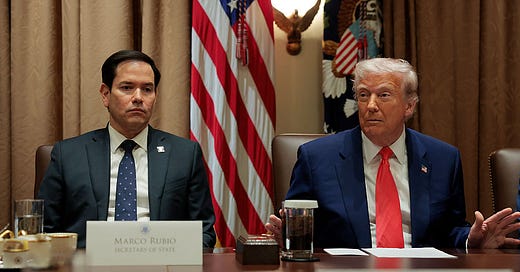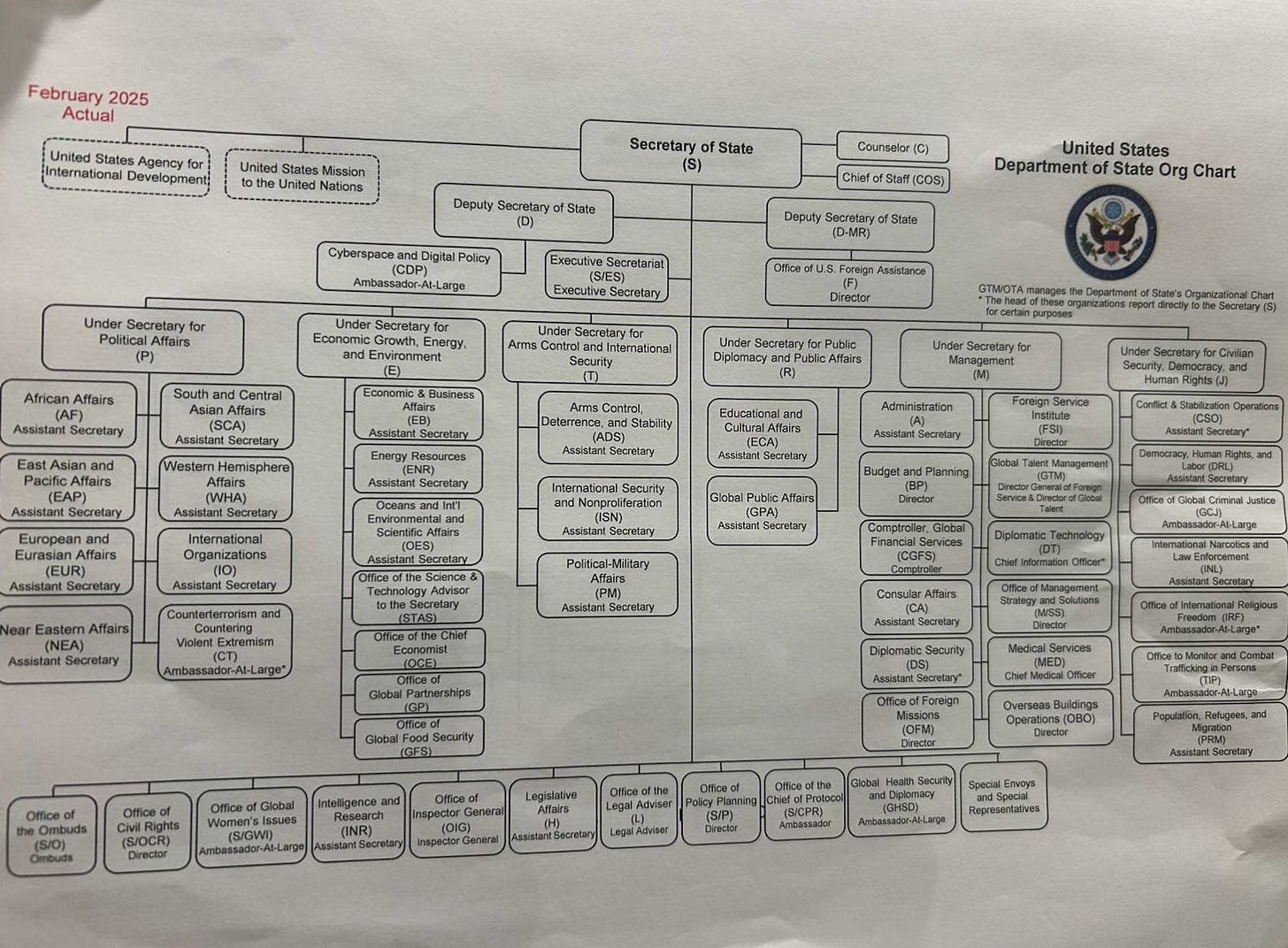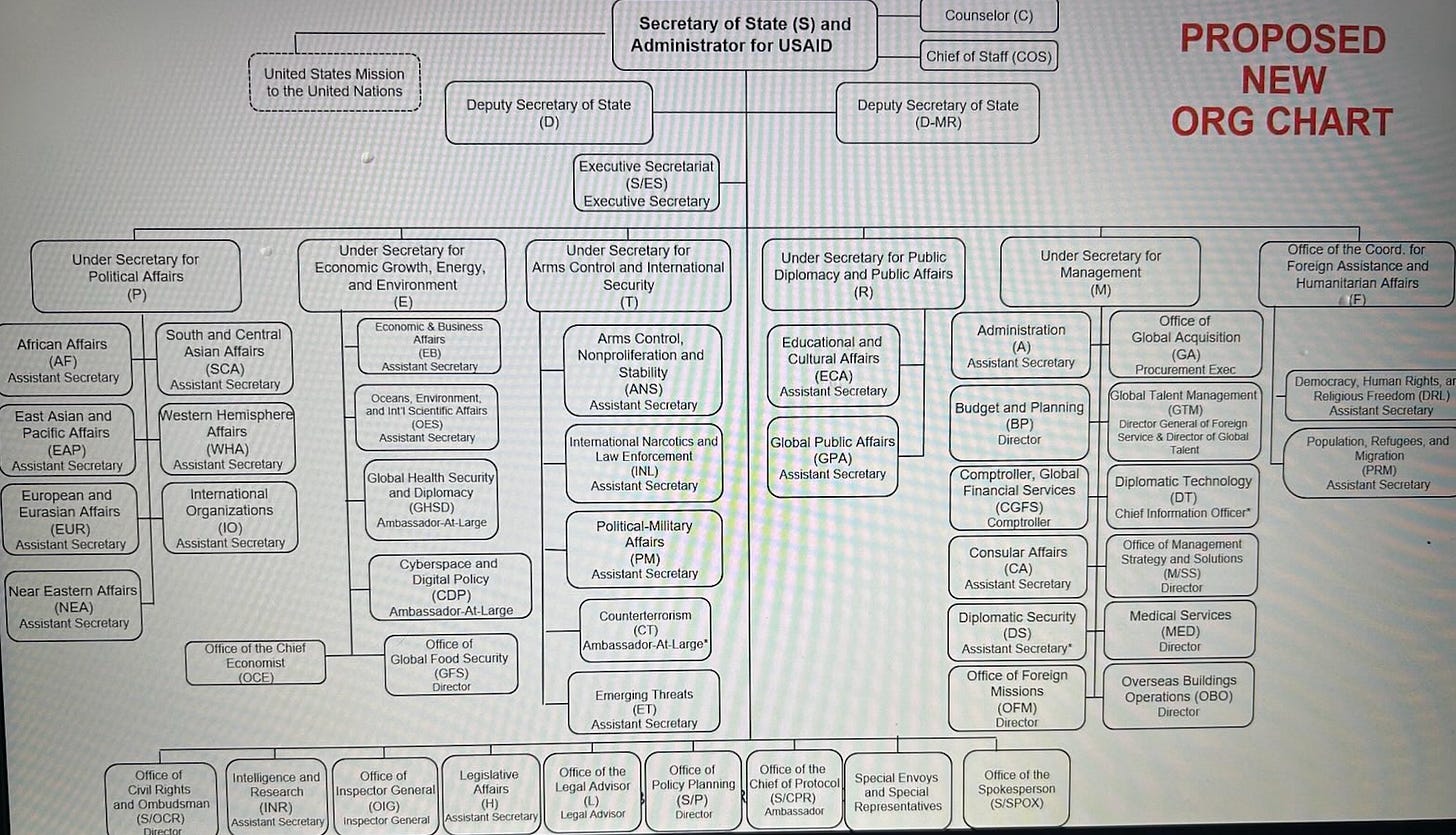
The Free Press

The Trump administration has begun an aggressive shake-up at the State Department that will close 132 agency offices, including those launched to further human rights, advance democracy overseas, counter extremism, and prevent war crimes.
The plans to reorganize the leading foreign policy agency in the United States are outlined in internal documents obtained by The Free Press. They show how the State Department will eliminate or restructure hundreds of offices in Washington, D.C.—a revelation that comes after reports in recent weeks of a rumored overhaul at the agency. The State Department is bringing its number of offices down from 734 to 602, a 17 percent reduction.
Separately, under secretaries at the State Department are also being instructed within 30 days to present plans to reduce their U.S. personnel in individual departments by 15 percent, according to a senior State Department official. These include six top offices employing thousands of people. The reorganization comes as the Trump administration seeks to drastically reduce the size and scope of the federal government.
Earlier this morning, roughly a dozen top officials at the State Department were briefed on the plans by leadership at the agency, according to a second senior State Department official. The State Department also sent a brief letter to Congress on Tuesday informing lawmakers that there will be changes to the department, although it is expected to send a more detailed congressional notice in the near future that will outline them. Officials say it is the biggest shake-up at the State Department “in decades.”
“In its current form, the Department is bloated, bureaucratic, and unable to perform its essential diplomatic mission in this new era of great power competition,” Secretary of State Marco Rubio said in a statement to The Free Press. “That is why today I am announcing a comprehensive reorganization plan that will bring the Department into the twenty-first century.”
Rubio is working alongside Elon Musk’s DOGE on the reorganization, according to one U.S. official familiar with the matter, who said Rubio has viewed the prospect of broad reform to the State Department as a priority since his time in the Senate.
Mike Pompeo, secretary of state during the first Trump administration, has also long believed a reorganization at the State Department is needed to streamline work. “The State Department is desperately in need of significant reorganization, and there’s much efficiency that can be gained there,” Pompeo told The Free Press.
Previous speculation, including a report published Sunday in The New York Times, had focused on the possible closure of overseas offices, including the elimination of almost all its Africa operations.
But the planning documents seen by The Free Press, several of which are marked “SBU” for Sensitive But Unclassified, make no mention of the rumored changes covered by the Times.
Rubio said the Times story amounted to “fake news.” And two senior State Department officials involved in the reorganization efforts said its contents bore no resemblance to the plan Rubio is now undertaking. The Free Press also obtained internal documents showing the proposed new organizational chart for the State Department.
According to the planning documents, the State Department will eliminate 132 of its offices along with 700 positions within them. These offices are wings of the agency in Washington, D.C., that focus on a variety of foreign policy issues and are viewed by the Trump administration as no longer necessary.
The 700 positions are for civil service and foreign service employees, rather than political appointees. The elimination of the roles is in addition to the State Department’s ask for under secretaries to reduce their personnel by 15 percent.
The State Department is also transferring 137 offices to other parts of the agency to consolidate programs.
“This approach will empower the Department from the ground up, from the bureaus to the embassies,” Rubio said. “Region-specific functions will be consolidated to increase functionality, redundant offices will be removed, and non-statutory programs that are misaligned with America’s core national interests will cease to exist.”
The Trump administration’s move will almost certainly face staunch criticism from Democrats in Congress, who have expressed concerns about national security and American diplomacy amidst reports of President Donald Trump potentially shrinking the agency.
The programs that the State Department is cutting are among those that do not require approval from Congress, the second senior State Department official stressed. Top offices at the agency will have 30 days to devise plans for how they will implement the changes, the second official said.
One notable part of the restructuring will involve an office called the Under Secretary for Civilian Security, Democracy, and Human Rights, also known as the agency’s “J programs.” It “leads global diplomatic efforts to advance universal human rights, democratic renewal, and human-centered security,” according to its website.
The J office, the documents show, is being overhauled and renamed as the Under Secretary for Foreign Assistance and Human Rights. There, officials plan to abolish its Office of Global Criminal Justice, which was formed in 1997 to advise on U.S. policy related to genocide, war crimes, and other grave human rights violations.
In the past, the Office of Global Criminal Justice has worked with the Department of Justice on investigating atrocities committed in Syria, and has aided Balkan countries in setting up war crime tribunals, according to a former State Department official. This March, the office met with a group of Syrians to discuss human rights issues.
Some functions of that criminal justice office will be absorbed by the State Department’s Office of the Legal Adviser, according to the documents.
Another office on the chopping block is the Bureau of Conflict and Stabilization Operations, or CSO. It received $336 million between 2016 and 2023, according to a report from the U.S. Government Accountability Office, an independent agency examining how federal funds are spent.
The CSO was established in 2011 to help anticipate, prevent, and respond to conflicts that may threaten U.S. national security, according to a press release upon its launch. The office says on its website that its programs have included generating data analytics to document war crimes by Russia-aligned forces in Ukraine and issuing policy recommendations to target radical armed forces in countries like Myanmar, Iraq, and Libya.
Earlier this month, The Washington Post reported on an internal memo that said the White House’s budget office was considering asking Congress to close the CSO as part of a separate proposal. The proposal would reduce the agency’s budget by $27 billion.
Rachel Cauley, a spokeswoman for the White House budget office, told The Free Press that no final funding decisions have been made.
“Nobody is really sure what they do,” the second senior State Department official said of the CSO. “When I ask them, they seem to not really be sure what they’re supposed to be doing. It’s an office that was created several years ago to look at Afghanistan [issues] and to avoid conflict areas. But we already have other offices within the department that do that.”
Brett Bruen, a former State Department official during the Obama administration, raised concerns last week that the possible closure of the CSO and other programs was the “demolishing of our international influence instruments.”
The State Department also has plans to eliminate “Countering Violent Extremism” (CVE) activities at the Bureau of Counterterrorism, the documents say. CVE refers to “actions to counter efforts by violent extremists to radicalize, recruit, and mobilize followers to violence and to address specific factors that facilitate violent extremist recruitment and radicalization to violence,” the State Department said in a 2016 report.
The State Department increased spending on CVE in 2015, at the height of ISIS’s rise to power in the Middle East, as part of a push to work with international allies on thwarting the spread of extremism, according to a 2019 State Department audit. Officials in the Trump administration are of the mind that the CVE programs at that bureau duplicate others in the agency, including programs at a bureau focused on international narcotics.
One significant way the Trump administration is consolidating programs is by targeting the U.S. Agency for International Development (USAID), which was launched in 1961 by President John F. Kennedy to administer foreign aid.
Since Trump took office, he has moved to slash most of USAID’s contracts over concerns that too much overseas spending was either wasted or not in alignment with U.S. interests. Congressional Democrats have said Trump’s attack on USAID is illegal.
The second senior State Department official told The Free Press that foreign assistance functions formerly run by USAID will now be taken on by regional State Department bureaus or folded into other existing offices. For example, USAID’s disaster assistance functions will be moved to the Bureau of Population, Refugees, and Migration and its health programs to the Bureau of Global Health Security and Diplomacy, the official said.
“On July 1, USAID ceases to exist,” that official added. The State Department has said it will complete its USAID reorganization by that date, which is expected to draw legal challenges since Congress established USAID as an independent agency.
The broader restructuring at the State Department will also see the elimination of a nuclear nonproliferation envoy role at a bureau working to prevent weapons of mass destruction.
According to the internal documents, the State Department is planning to create an office called the Bureau of Emerging Threats. It will focus on cyber threats to the U.S., the second senior State Department official said.
“We’re trying to streamline the organization, to centralize functions that should be centralized, and to focus on the big things that support our America First diplomacy out in the field,” the official added.







